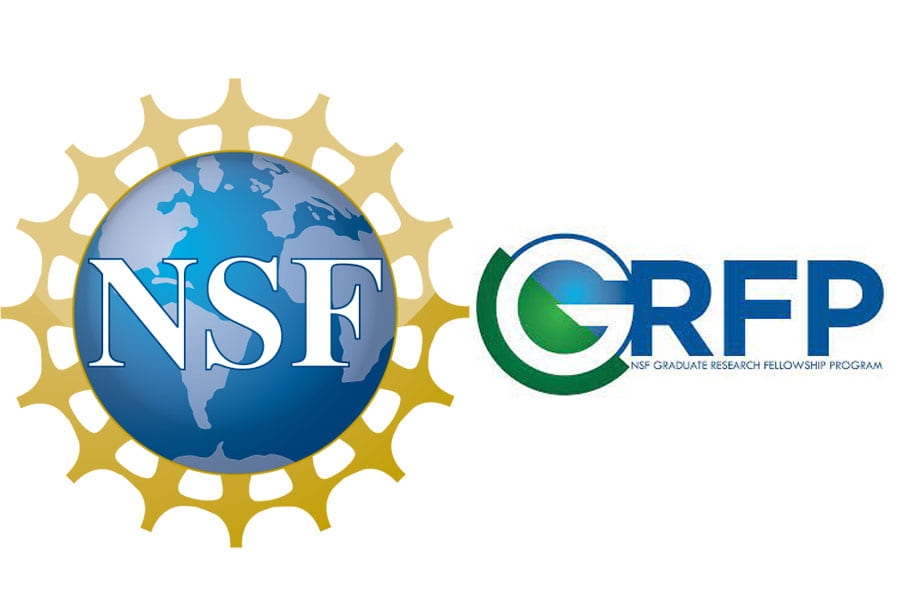Four U of A students and recent alumni have been recognized by the National Science Foundation for its graduate research fellowship.
Gabrielle Bulliard, a recent graduate with honors in biomedical engineering, and Rachel Taylor, a Ph.D. student in cell and molecular biology, were awarded the fellowship. Ally Heiland, a Ph.D. student in clinical psychology, and Marius Unnvik, a master’s student in social psychology, were selected as honorable mentions.
The highly competitive award, considered one of the nation’s top academic honors, is given to students pursuing graduate studies in science, technology, engineering or mathematics fields and recognizes academic excellence and the potential that each student will make to their field and to society at large.
Since the program’s inception in 1952, 163 U of A students and alumni have received this prestigious fellowship; 97 have received honorable mentions.
According to the National Science Foundation, more than 12,000 students apply each year for its graduate research fellowships. Approximately 2,000 receive awards, which they take to U.S. graduate institutions of their choice.
Each fellowship is worth $37,000 per year and can be renewed for up to three years. Along with the renewable stipend, each student’s institution will receive $16,000 per year to offset tuition costs, bringing the total amount of funding awarded to these two students to $318,000.
“Research is a cornerstone of our institution, one of the three key pillars of our 150 Forward strategic plan, and student research is an important part of our efforts,” said Terry Martin, provost and executive vice chancellor for academic affairs. “These NSF Graduate Research Fellows and honorable mentions are shining examples of the work our students our doing, the new knowledge they are creating and the dedication they embody. Congratulations to them, to their research mentor, their departments and their colleges. Successful research is a community effort.”
GABRIELLE BULLIARD
 Bulliard is working to treat genetic neuromuscular diseases and non-muscle genetic diseases.
Bulliard is working to treat genetic neuromuscular diseases and non-muscle genetic diseases.
“This award will allow me to have more freedom in my future research,” Bulliard said. “The Ph.D. program I am enrolling in at UT Southwestern is a rotation-based program, so I will not be joining a lab until after the first semester or two there. When I do, I should have more freedom in picking a lab to join, as they will not need to support me financially. The GRFP will allow me to join labs that I would not be able to do otherwise.”
Following her Ph.D., Bulliard ideally plans to conduct research at a lab associated with a children’s hospital.
RACHEL TAYLOR
 Taylor is studying targeted treatments for Magnaporthe oryzae, a fungus that is responsible for the destruction of enough rice to feed 60 million people annually.
Taylor is studying targeted treatments for Magnaporthe oryzae, a fungus that is responsible for the destruction of enough rice to feed 60 million people annually.
“I am incredibly grateful to have received the NSF GRFP and could not have done it without the support from my mentor, Dr. Martin Egan, as well as the entire Egan lab,” Taylor said. “This award is an absolute honor that will have a major impact on my research and career endeavors moving forward.”
After graduate school, Taylor plans to pursue a career in academia.
HONORABLE MENTIONS
ALLY HEILAND
 Heiland, a current student at The Ohio State University and a recent U of A graduate, is studying how positive psychology, the “broaden and build” theory of positive emotions, savoring and positive emotion regulation, manifests in interpersonal interactions.
Heiland, a current student at The Ohio State University and a recent U of A graduate, is studying how positive psychology, the “broaden and build” theory of positive emotions, savoring and positive emotion regulation, manifests in interpersonal interactions.
“While I did not receive fellowship support, working on this proposal and receiving feedback provided me with a thoughtful plan for how to continue this line of research,” Heiland said. “I am currently a second-year Ph.D. student in clinical psychology at Ohio State, where I plan to continue researching these and related questions and continue building my skillset as a researcher.”
MARIUS UNNVIK
 Unnvik is studying the psychological mechanisms that humans and animals use to protect themselves from diseases.
Unnvik is studying the psychological mechanisms that humans and animals use to protect themselves from diseases.
“Being named an honorable mention for the NSF GRFP fellowship was a reassuring accolade that the research I proposed is important and noteworthy,” Unnvik said. “It has helped to reaffirm my commitment developing research projects on the association between pathogen avoidance and intergroup prejudice, as well as other related subjects.”
Following a Ph.D. in experimental psychology, Unnvik plans to pursue a postdoctoral position followed by a career as a psychology professor.
“Just going through the process of applying is a significant learning experience for students involved in research,” said Suzanne McCray, who heads the Office of Nationally Competitive Awards. “Faculty mentor support is extensive and ongoing. We also have faculty who help with the application process regardless of the student’s major. Dr. Magda El-Shenawee, professor of electrical engineering and a national application reviewer for NSF GRFP, has been unstinting in her support for students who are applying for the award for many years. Dr. Sarah Durant’s efforts in biological sciences (including a class she teaches on science communication) has also been key, and of course, the students are amazing, and the work they do is compelling. The Office of Nationally Competitive Awards benefits from these collaborations and would welcome more as we work to expand the number of students who have access to these exceptional opportunities.”
Office of Nationally Competitive Awards: University of Arkansas students and recent alumni interested in applying for scholarships and fellowships and faculty wishing to identify competitive students should contact the Office of Nationally Competitive Awards at awards@uark.edu or 479-575-3771. More information is available at awards.uark.edu.
About the University of Arkansas: As Arkansas' flagship institution, the U of A provides an internationally competitive education in more than 200 academic programs. Founded in 1871, the U of A contributes more than $2.2 billion to Arkansas’ economy through the teaching of new knowledge and skills, entrepreneurship and job development, discovery through research and creative activity while also providing training for professional disciplines. The Carnegie Foundation classifies the U of A among the few U.S. colleges and universities with the highest level of research activity. U.S. News & World Report ranks the U of A among the top public universities in the nation. See how the U of A works to build a better world at Arkansas Research News.
Topics
- Awards
- Engineering
- Research & Innovation
- Science
- Points of Pride
- Natural Environment
- Data & Statistical Analysis
- Technology
- College of Engineering
- Fulbright College of Arts & Sciences
- Honors College
- Enrollment and Admissions
- Division of Research & Innovation
- Department of Biological Sciences
- Department of Psychological Science
- Department of Biomedical Engineering
- Scholarship Office
Contacts
Suzanne McCray, vice provost for enrollment
Dean of Admissions and Nationally Competitive Awards
479-575-4883, smccray@uark.edu
